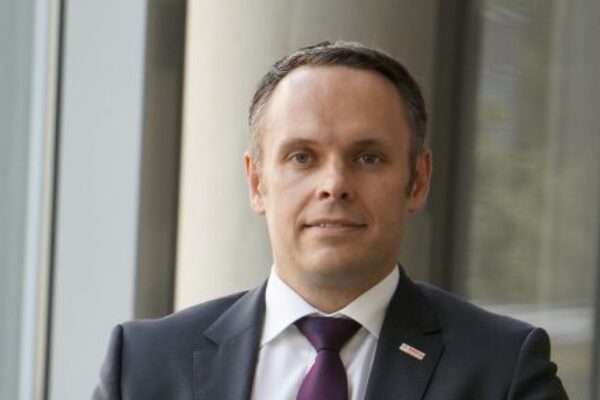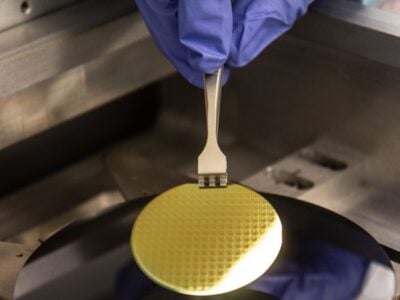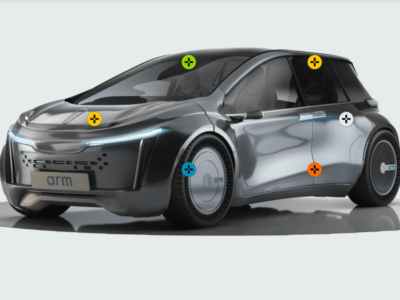
The formation of the company, known as BCDS, was announced in December 2013 (see Bosch sets up IoT subsidiary) and has now grown to 100 employees split between Reutlingen and Coimbatore, India. There are plans to expand early in 2015 at locations in Chicago and Shanghai, Mueller told eeNews Europe, although there are no specific head-count targets.
But the staff are focused on the company’s mission of rolling out ready-to-use Internet of Things (IoT) systems for customers to take to market in four areas; smart home, transport and logistics, connected industry and personal smart activity.
Mueller, a PhD in physics, joined Robert Bosch, in 2005 at which time he was put to work in corporate research on inertial MEMS. In 2008 he joined the automotive business unit of Bosch working on strategic planning and clustered MEMS sensors and was also worked on the due diligence behind the acquisition of MEMS microphone company Akustica Inc. in 2009 (see Bosch acquires MEMS microphone pioneer Akustica).
Mueller said that although BCDS is intended to be a follow-on initiative to the successful Bosch Sensortec GmbH – which has taken the parent company into consumer markets and adding to original success in automotive – it will be different. Whereas Bosch Sensortec is essentially a component and hardware company, BCDS is a system-level company with a much greater emphasis on software.
This is partly because BCDS can, and should, stand on the shoulders of the initiatives that have gone before and partly because levels and styles of integration have changed and the creation of value in the Internet of Things will often be in the data that is collected.
Next: Corporate R&D and reuse
Although BCDS is like a startup within Robert Bosch, it can lean on 1,000 engineers engaged in corporate research and BCDS will re-use MEMS sensors created by Bosch Sensortec for use in consumer applications, Mueller said. BCDS will focus on complete solutions that include sensor platforms, software and services and extend from leaf-node to the cloud.
"Bosch Sensortec and Akustica are supplying components. BCDS is providing solutions that are market ready. We will heavily use the devices provided by Bosch Sensortec and Akustica," said Mueller.

Thorsten Mueller, CEO of Bosch Connected Devices & Solutions GmbH.
"Our first product is a stick-on door sensor the size of a matchbox, that detects the status of the door, can tell the difference between movement, knocking and violent intrusion and send reports to the cloud which can in turn send a phone alert to appropriate persons." The HIS110 unit can also be applied to windows and detects conditions such as whether doors and windows are open, closed or tilted and offers advanced detection of intrusion attempts. This functionality can even be extended to monitor universal movement detection. The product is being made for BCDS in a Bosch automotive electronics factory in Suzhou, China. This is another example of how BCDS can leverage the investments that have gone before into other parts of Robert Bosch.
"Typically BCDS will produce something that includes a PCB with multiple sensors, local intelligence with an MCU and a radio, be it Bluetooth, ZigBee or GSM radio. We are not a component business. Our solid foundation is ready-to-use equipment as a tier-one supplier. There is no intention to design sensors on our own. A sensor is a component we would buy in. Obviously Bosch is the preferred supplier but we can source externally," he told eeNews Europe.
This explains why BCDS’ is recruiting staff in India to work on embedded software.
eeNews Europe asked if this one-step-removed approach to hardware could be a disadvantage to BCDS when it came to miniaturization and integrating sensors, MCUs and RF monolithically.
"There will be a trend towards miniaturization. It is something Bosch Sensortec will be following. But for our customers right now high integration is not necessary and too expensive. In the domains we are addressing the customers value short time-to-market and flexibility. So we are not only hardware but also a software company. There is the great scope to save energy for battery-operated device by crafting the best algorithms and writing optimized embedded software."
Next: Every Bosch product connected to the Internet
Mueller said that BCDS will also be supported by an internal market for its solutions within Robert Bosch as it will have a dual role with both external and internal customers. "The company has stated that every Bosch product will be connected to the Internet," said Mueller indicating that this represents a significant amount of work that BCDS will be required to contribute to other divisions. "We are starting with home appliances and power tools. And for these customers time to market is key."
With regard to external customers BCDS is likely to start with the smart home and transport and logistics, Mueller said. "We will also be working on the connected industry but there are many locations internally where we can deploy wireless sensor networks. And it is much better where we can bring proven solutions to market," Mueller said.
There is another way that BCDS may differ from previous Bosch subsidiaries, partly because of the position it is taking in the market, closer to systems and services. "The automotive group does much work alone. BCDS will have to be very open to partnership."
Mueller pointed out that ABB, Bosch, Cisco plan to establish a joint venture that will develop and operate an open software platform for smart home devices and applications. In addition to developing and operating the software platform, the companies intend to invite appliance manufacturers, home automation vendors, and service providers to join a business ecosystem.
By creating a standard open software platform that will enable the exchange of data between different manufacturers’ devices the three companies hope that software developers will be able to create a wide variety of applications for use in the areas of energy management, security technology, and entertainment.
Next: Data security
When asked whether that open-ness to partnership included being prepared to join Thread, a similar group based around Google, through its Nest Labs subsidiary, Samsung Electronics, Freescale Semiconductor, ARM Holdings plc Yale Security and Silicon Labs. The Thread group wants to create an IP-based wireless networking protocol for use in the smart home. "You cannot be part of every alliance," said Mueller. "The groups we join will depend on our customers."
With further regard to intellectual property provider ARM, Mueller said: "ARM is very prominent. Many of our microcontrollers are ARM based but it is not strategic."
"In 2015 about 6 billion devices are connected to the Internet. We think that by 2020 30 billion devices will be connected and most of them will not be classic products, PCs, smartphones."
So Mueller is clearly a believer in the significance of IoT. "I think it will be transformational. But the term IoT is abstract. This transformation will be about specific applications that connect to the smartphone. It all depends on what you do with the data."
Which means that of all the things BCDS will be working on, data security and encryption will be among the most significant, said Mueller.
Related links and articles:
News articles:
Bosch Sensortec’s Electronica booth invaded
Bosch Sensortec grows in mobile and beyond, says CEO: Part 1
Bosch Sensortec grows in mobile and beyond, says CEO: Part 2
 If you enjoyed this article, you will like the following ones: don't miss them by subscribing to :
eeNews on Google News
If you enjoyed this article, you will like the following ones: don't miss them by subscribing to :
eeNews on Google News




